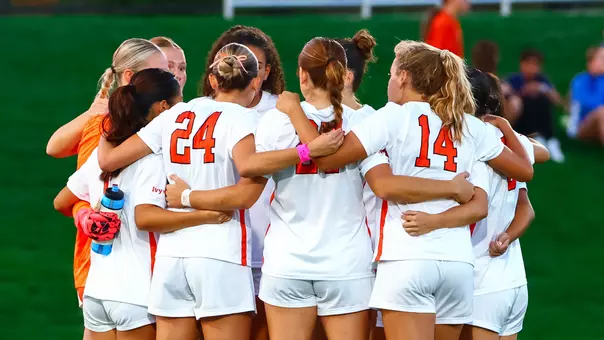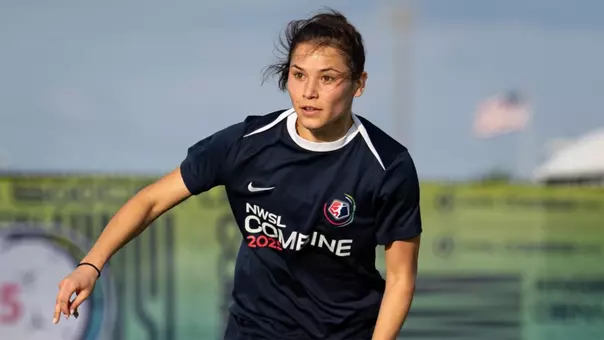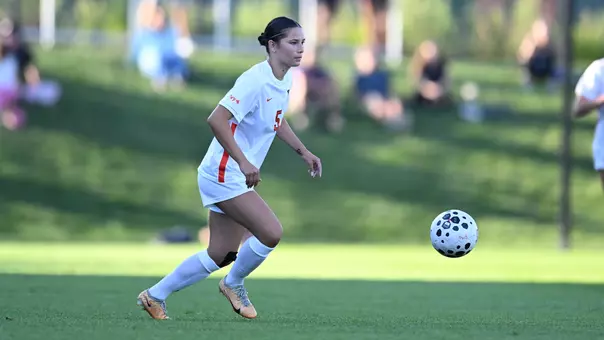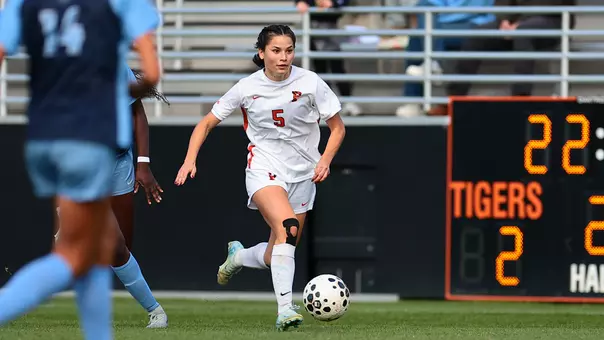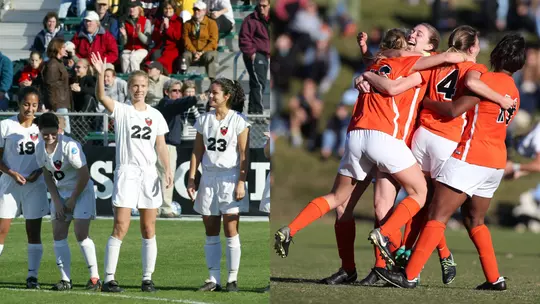
Program of the Postseason: Looking Back at Princeton Women's Soccer's Longest NCAA Tournament Runs
7/1/2020
All eight Ivy League programs have won at least two league titles in the 40-plus seasons of Ivy women’s soccer, and three programs have won at least 10, Princeton among them.
But when it comes to the postseason, no program can claim the heights Princeton has achieved, and no Princeton teams added more to that success than in 2004 and 2017.
The league’s teams have had chances to make their own success. Seven of the eight Ivy programs have played in the NCAA tournament, and 14 times, the Ivy has sent multiple teams to the tournament, including four teams in 1999 and 2001.
But since that 2001 tournament, when the event expanded to 64 teams, the only program to make the final eight has been Princeton, in 2004 and again in 2017.
They were not the first Ivy teams to make the national quarterfinals. It happened seven times, all in bunches between 1982 and ’84 and again in 1997 and ’98. All seven times, including with Princeton in 1982, the runs ended in the quarters, and the teams had a shorter path to get there.
The 2004 and 2017 runs had key differences, most obviously that the ’04 team went a game further, making the national semifinals, and the ’17 team saw its run end in the quarters. The ’04 team played each of its first four games at home, and the ’17 team was on the road after the first round.
The ’04 team was making the program’s sixth consecutive trip to the NCAAs, and the ’17 team, while just two years removed from its most recent tournament trip, bounced back from a 2016 season that had a 9-1-1 start before a 1-3-2 finish in league play in which all three losses came by a combined four goals.
While the ’04 and ’17 runs had in common that UCLA happened to end both, their ranking in program history need not be debated. The 2004 team has its status as the only Ivy League team to make the national semifinals, regardless of the size of the tournament, and the 2017 team will always have the win over a North Carolina team that, in addition to holding a sport-best 21 NCAA titles, was coming off a national semifinal run in 2016, and went on to make the national final in each of the two seasons since.
“We were incredibly proud of the 2017 team for believing in themselves enough and not letting intimidation get to them and really playing their game there,” Emily Behncke ‘06, who scored 13 goals for the ’04 Tigers, said. “And then I think our 2004 team had some wonderful, special moments and situations of their own that make it unique and different.”
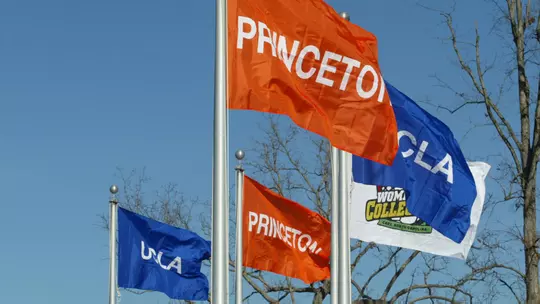
Though the 2004 Tigers were making the program’s sixth straight NCAA tournament appearance, just one of the previous five advanced out of the first round, and three of the four that didn’t were each by a one-goal loss.
Even without the experience of long postseason runs, the 2004 team brought back all five first- and second-team All-Ivy players from a 2003 team that earned an at-large bid to the NCAAs.
“We felt like, in the previous years building up to the 2004 season, that we had a very competitive team and had the ability to really make some things happen that were special,” Behncke said. “We had a very seasoned team, and I think that helps with confidence.”
Esmeralda Negron ’05, who went on to have a record-breaking season in 2004, turned in 13 goals and 30 points in 2003, numbers that tied the program record for goals and were just a point off the program’s point mark.
The start to the ’04 season was as much of a bang as the end of the ’03 campaign was a whimper. Following a loss to Penn in the ’03 season finale and then another to Villanova in the NCAA first round, Princeton opened the ’04 season by taking down No. 5 Texas A&M 2-1 on goals from Negron and a rookie in Diana Matheson ’08, who was less than a year and a half removed for her debut with the Canadian national team, a career for her country that went on to include three FIFA Women’s World Cup teams, two Olympic teams and a 2012 Olympic bronze medal in which she scored the winning goal in the game to claim that medal.
The win over Texas A&M put Princeton into the national rankings at No. 20, and around a 1-0 trip-up by Wake Forest, Princeton won 14 of its first 15 before entering the NCAAs at 15-2 and with the first 7-0 Ivy record in program history.
The regular-season success earned Princeton the No. 7 seed in the tournament overall, guaranteeing that Princeton would host the first three rounds of the NCAAs, if it advanced. The Tigers took advantage, dispatching Central Connecticut 5-0 in the first round and getting a goal from Maura Gallagher ’06 with 6:50 to play before penalty kicks would have decided the second-round game against Villanova, allowing Princeton to avenge the first-round NCAA defeat from the year before.
Two of the four seeded teams in Princeton’s quadrant of the bracket didn’t survive the first weekend. Tenth-seeded Florida, which would have been Princeton’s round-of-16 opponent had the seeds held, fell 3-2 to UCF in the first round, and then Boston College beat UCF in the second round to set up a round-of-16 game with Princeton. Even more beneficial to the Tigers, second-seeded Penn State, which would have hosted the national quarterfinals if it kept winning, lost 1-0 to Maryland in the second round, allowing Princeton the chance to host the quarters. Princeton took care of Boston College 2-0, setting up a quarterfinal matchup in Princeton with the only two seeded teams left in that corner of the draw, with 15th-seeded Washington making the long trip east.
“(Playing at home) was a big part of what made it all so special. First, it gave us the confidence that we were a true contender,” Behncke said. “We loved our stadium, we loved our fans, and the fact that we were able to do that all the way up through the quarterfinals was definitely a big factor in the success we had. So many classmates and friends came out to cheer us on.”
Behncke scored eight minutes in, and though Washington drew even at 1-1 before halftime, Negron extended her program record with her 20th goal of the season in the 51st minute, and Kristina Fontanez ’05 scored five minutes later to help Princeton make history, 3-1.
Princeton was off to Cary, N.C. to face 14th-seeded UCLA in a final foursome in which Princeton was the second-highest seed, behind fourth-seeded Notre Dame.
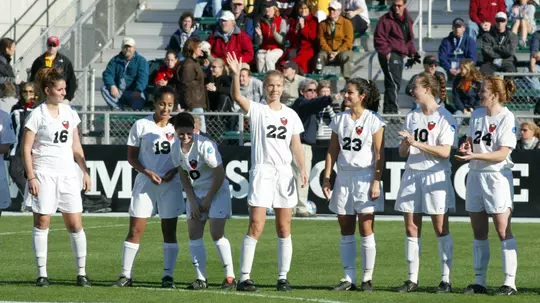
It was impossible to know then, but the town of Cary figured into Princeton’s soccer history again, 13 years later.
North Carolina was in the midst of a renovation of its usual home field on campus, and so the Tar Heels’ home for the year was a field called Koka Booth Stadium, part of the same complex and in the shadow of the larger stadium that hosted Princeton the 2004 NCAA semis and finals.
As impossible as it was to know in 2004 that Cary would figure prominently in another chapter of the program’s lore, it would also have been quite a prediction that the 2017 Tigers would have been in position to take down UNC in the round of 16 that season.
Along with the hard-luck Ivy finish in 2016, Princeton would have to figure out how 2017 would look without Tyler Lussi ’17, who came along and broke Negron’s record for career goals and points.
Lussi led the 2016 team with 10 goals, one more than Mimi Asom ’18 as the pair had 19 of the team’s 30 goals on the year.
Asom was back at it in 2017, with 10 goals, and a year after combining for three goals, Abby Givens ’20 and Courtney O’Brien ’20 helped fuel Princeton’s success in 2017, combining to score 21 times.
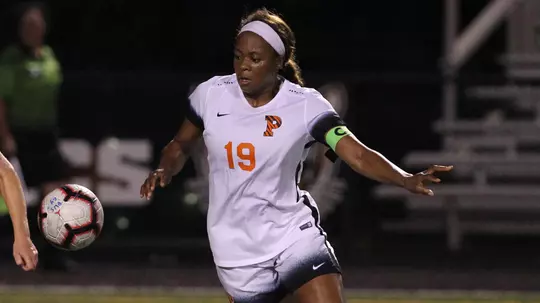
As with 2004, some early-season results caught national attention. On the season’s second weekend, Princeton beat No. 20 North Carolina State and No. 18 Wake Forest, both 2-0 and both on the road. And as with ’04, the regular-season losses were few, one each to a major-conference team, and one other to a New York-based team. The 2017 Tigers fell by just a goal to No. 6 West Virginia in Princeton, and as the ’04 team tripped up against Colgate, the 2017 team had a stumble against Columbia with three weekends remaining in the season. The Lions were on Princeton’s heels all the way through, as a last-weekend tie by Columbia allowed Princeton to claim the outright Ivy title and the league’s automatic NCAA bid, though the Tigers were in strong position anyway for an at-large at No. 13 in the nation.
Thanks to an NCAA tournament format change that took effect in 2011, a team had to be in the top eight in the nation to be in control of hosting beyond the first round. Missing out on that, Princeton rolled past Monmouth in the first round, and the weekend in North Carolina was set.
In each game, as we know, Princeton found a way to win – or advance, as the N.C. State game is officially a tie – and it wasn’t all the high-scoring trio of Givens, Asom and O’Brien. In the N.C. State game, a rematch from earlier in the season, then-freshman Carolyne Davidson scored in the 66th minute, and although the lead lasted only until New Jersey native Tziarra King tied it in the 82nd, Davidson, whose regulation-time goal was the third of her career and second of the tournament, stepped up again.
After coming up empty in the first round of the penalty-kick shootout, Princeton was a kick away from being eliminated in the second round once N.C. State made its first four shots and went into the fifth and potentially final round needing one more to end it there. Grossi made a stop on the fifth to deny N.C. State for the first time, and after Tomi Kennedy ’20 leveled things and sent it to a round-by-round shootout to advance. After a miss both ways in the sixth round, Grossi made another save in round seven, and Davidson stepped up to end it, sending Princeton on.
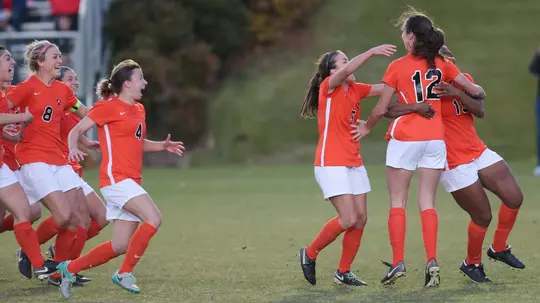
North Carolina, the top seed in that quadrant of the bracket and the second-ranked team in the country, hadn’t allowed a goal through the first two rounds of the tournament, standing up a 26th-minute goal in a 1-0 second-round victory over Colorado to advance. The Tar Heels hadn’t allowed a goal in four straight games, winning the ACC Championship with shutouts against Triangle foes N.C. State and Duke, and was 13-0-2 over its last 15 games, with its only loss of the season to that point coming 1-0 to Penn State more than two months earlier.
The shutout streak lasted less than four minutes into the game. A failed clearing kick led to an own goal, and even after UNC tied it in the 25th minute, the game stayed level through the end of regulation, even as Princeton was outshot 24-8 overall and 8-3 on goal.
Then, more than eight minutes into the first overtime, North Carolina native Givens broke free, getting behind the UNC back line and scoring one of the biggest goals in program history.
‘North Carolina, I don’t even know how to describe it. That was a crazy game. We were definitely the underdog, and we were just going out there and just wanted to see what we could do,” Grossi said. “It’s hard comparing any other season to that, but it was definitely a memorable year.”
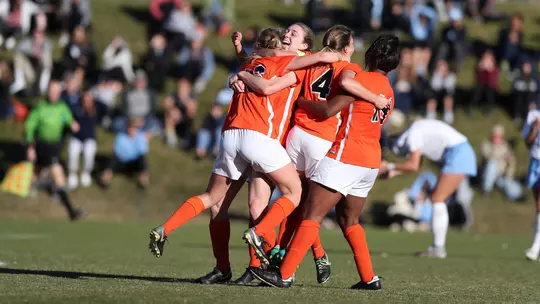
One didn’t need to be on the 2017 team, of course, for the moment to be memorable.
“It helped remind us of the wonderful memories that we created during that 2004 season, but it also showed the strength of the Princeton soccer program overall. To go back to the tournament year-in, year-out and then to go back in 2017 and make it to the quarterfinals and defeat the biggest powerhouse in women’s soccer is a testament to the strength of the Princeton soccer program,” Behncke said, also mentioning the men’s program’s run to the national semifinals in 1993.
Putting Princeton’s win in perspective, UNC has made all 38 NCAA tournaments through 2019, fell as early as the second round only once, and in the third round six other times, including in 2017 against Princeton. The Tigers joined a list that includes Santa Clara, Notre Dame, UCF, South Carolina and Texas A&M as teams to defeat UNC in the NCAA tournament in the round of 16 or earlier.
The road got easier only by the seeds for Princeton, which, after knocking out UNC one field over from where the 2004 Princeton team saw its longest-ever NCAA run end, won the right to meet the same program that ended the ’04 run, this time on the second-seeded and fourth-ranked Bruins’ home field in Los Angeles. Both UCLA-Princeton meetings in the tournament ended in two-goal Tiger defeats to Bruin teams that came within the smallest of margins of being national champions, in penalties to Notre Dame in 2004 and by a goal to Stanford 13 years later.
“I think you can certainly compare them in that both made deep runs in the tournament, but I think that they both deserve to be looked at in their own right,” Behncke said of the 2004 and 2017 postseasons. “The North Carolina win, that’s something that not a lot of programs can say, and especially in a moment like that. North Carolina has to show up to every game because everyone wants to beat them day in and day out, so it’s one thing to beat them in a preseason game or in a regular-season game, but to beat them in the tournament, on their home ground, is something incredibly special and that very few teams and programs can say that they’ve done.”
The two peaks of postseason success came within a 20-year span that saw Princeton make the NCAA tournament 11 times between 1999 and 2018, advancing past the first round five times including two of the last three trips.
As making the postseason has been a regular expectation for the program, so has the connection of alumnae through the classes and years.
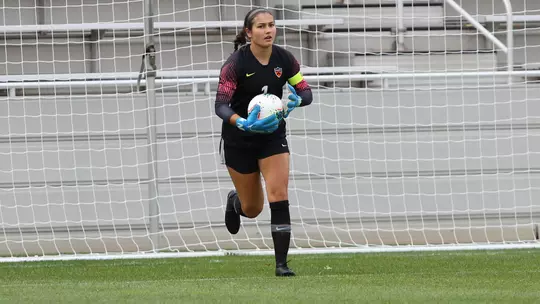
“When we beat North Carolina and we were going to the quarterfinals, a lot of alumnae reached out to us to wish us good luck, including from the ’04 team, so that was definitely exciting. It’s elite company to be compared to the ’04 team,” Grossi said. “Now, with graduating, a lot of the alumnae have reached out, and becoming part of that community has been nice.”
Grossi, who during her senior year became the Ivy League’s all-time leader in career shutouts, leaves a program that saw Princeton add its 12th and 13th NCAA tournament appearances and its ninth and 10th Ivy League championships during her time there.
“I think our goal was just to move the program forward while we were there,” Grossi said. “We’re looking to make the program a top-25 team every year. It’s special that we were the only Ivy to make it (to the quarterfinal over the last 20 years), but I think the Ivy is always getting stronger as a whole, so it’s definitely exciting to see what the future holds for Princeton and the Ivy League programs.”

